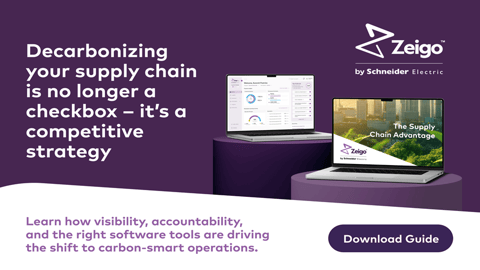4 Ways Procurement Teams Can Pave the Way Toward Sustainability
Sustainability has gone from a back-burner topic to a business imperative. Across every industry, consumers, investors, and employees are demanding that companies of all sizes operate responsibly and sustainably. In response, governments are implementing new regulations — and rightfully so.
However, an Economist Impact report sponsored by SAP revealed that amid economic challenges like inflation, sustainability returns to the back seat for both businesses and consumers. In reality, it should be the opposite. Companies may have all the ambition in the world to set sustainability targets. But if they miss them, there’s a clear disconnect between what they want to achieve and the realities of their business.
What will drive companies to accomplish these goals? Regulation. As regulatory pressure mounts, businesses must embrace sustainability as a long-term strategy that can ultimately future-proof their supply chain and ensure financial stability.
Against this backdrop, procurement leaders have a unique opportunity to drive impactful sustainability initiatives within their companies. Here’s how:
Prepare for Forthcoming Regulations — and the Science Behind Them
Sustainability-related regulation is not a matter of if, but when. While environmentally friendly procurement practices have been a priority in the private sector for years, investment and attention from the public sector is also increasing and so is the potential for regulation.
Mitigating scopes 1-3, scope 3 emissions, and commitments to be net zero scope 3 emissions by 2035 are all under a microscope right now and will require massive investment to manage. So, while the true cost may not be apparent right now, leaders who invest will help future-proof their organizations.
In the United States, policies like Federal Supplier Climate Risks and Resilience Rule are gaining traction, which would require major federal contractors to disclose their environmental data. Meanwhile in Germany, lawmakers passed the LkSG Act to regulate companies’ social and environmental responsibility within their supply chain. Companies knew that these regulations were coming and had the chance to prepare for them. If they had already taken the appropriate steps, they wouldn’t have had to scramble — and could have avoided paying penalties for not adhering to these new guidelines.
As 50% of consumers believe that companies are exaggerating their sustainability claims through greenwashing to mislead customers, regulation may be the catalyst to hold them to their commitments.
Integrate Sustainability Measurement Into Decision-Making
Incorporating sustainability into procurement decision-making makes good business sense. It also appeals to customers, positioning companies to boost sales and challenge competitors.
But you cannot manage what you don’t measure. Companies may have the best of intentions to make an impact, but many things fail to go beyond pilot phases, especially if other areas of their business are affected by macroeconomic forces like inflation. Every company needs to have clear goals. But to track their progress toward them and make informed decisions that help achieve them, they need to use the right tools.
[Read more: Unilever, Walmart, Bel Group Pledge #TooGoodToWaste With Consumer Goods Forum]
One simple way to do this is to start working backwards with targets each year, with a waterfall approach that gradually moves closer to net-zero goals. By embedding sustainability data into business processes using information that is already collected — such as bills of material, energy usage and procurement data — companies can get a clearer view of their carbon footprints. Within procurement specifically, factoring in sustainability allows teams to clearly understand their total cost structure and protect supply chain continuity, especially as they plan for the future.
Set up Specialized Teams to Navigate Emissions Standards
Right now, no one in procurement is trained to make purchasing decisions based on emissions standards. The time to build and train these teams is now.
These teams will have to consider the full spectrum of sustainability in their work. As they aim to buy products and services with positive environmental and social impact, they must consider using sustainable materials, prioritizing suppliers with strong human rights track records, and evaluating the entire lifecycle of a product or service.
When one leading chemical company began an organization-wide procurement transformation, it dedicated significant resources to change management — standing up an expert desk to support suppliers with questions and a global team of nearly 300 team members to guide users through the new processes. Standardizing this process allowed the company to scale its sustainability impact in a way it couldn’t have done before.
By building these specialized teams dedicated to sustainability, companies can not only appeal to a new generation of young workers who want to be a part of these meaningful efforts and ultimately drive the adoption of new technologies. And as technology advances at a remarkable speed, teams will be able to more clearly measure their performance against their goals.
Embrace Procurement Technology
Procurement technology plays a crucial role in driving sustainability efforts. By leveraging advanced analytics and digital control towers, companies can gain insights into their supply chain, identify areas for improvement, and make data-driven decisions. Armed with this knowledge, procurement leaders can target inefficiencies and optimize processes, better positioning their organizations to meet their sustainability goals.
Automation tools represent another facet of procurement technology that holds immense value for sustainability efforts. By automating various stages of procurement, teams can achieve greater operational efficiency while minimizing the consumption of resources. Further, in the pursuit of sustainability, transparency and traceability are non-negotiable imperatives. This is where business networks become critical, ensuring that a digital trail underpins all transactions to engender scale and enable verification.
Procurement leaders cannot make their organizations sustainable overnight or on their own. But they can leverage their unique position within the organization to chart a course to a more ecologically responsible and socially conscious future, benefiting the bottom line and the planet alike.
—Baber Farooq, Senior Vice President and Head of Market Strategy, SAP Procurement Solutions





